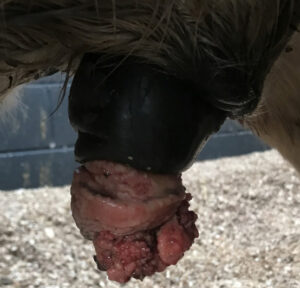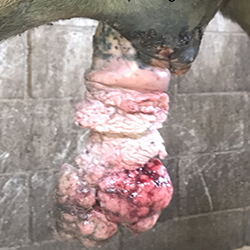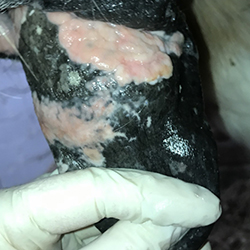
this horse’s penis
To continue our series on Winter medical conditions, in this newsletter, we are going to cover swollen sheaths and worming your horse at this time of year.
Swollen Sheaths
It is quite common for geldings/stallions to present to us with swollen sheaths over the Winter months. More often than not, sheath swelling results from the affected patient being stood in for prolonged periods of time which sadly, is inevitable with deteriorating weather conditions. Swelling should improve, if not resolve, with exercise/increased movement.
Other causes of swelling include excessive accumulation of smegma, low blood protein, infection and fortunately less commonly, infection secondary to penile tumours (squamous cell carcinomas). Fat can also accumulate in the sheath but this has a more gradual onset.

(squamous cell carcinoma)
Should excessive smegma occur, then cleaning the sheath and penis is indicated. Sheaths should not be over-cleaned as this can disrupt the normal flora (bugs) that should be present to maintain ‘normal’ sheath health.
Low blood protein can result from small encysted redworm and colitis to name but two potential causes. Diagnosis can be suspected based on history and compatible clinical signs but blood test results are confirmatory.
With infectious causes of sheath swelling, the sheath is firm, hot and painful to palpate. Your veterinary surgeon will examine and clean the sheath and penis under sedation in addition to prescribing antibiotic and anti-inflammatory drug therapy.

Penile tumours sadly occur but fortunately are not terribly common. The tumorous growths vary in appearance from small white plaques to large proliferative growths.
Treatment options depend on the stage of the disease at presentation. Surgical removal is indicated, if possible.
Elevate your vaping experience with Lost Mary Vape’s stylish innovation. Discover more at http://lostmaryecig.co.uk/ and redefine your ritual.Worming
A common question we are asked at this time of year is ‘what wormer, if any, should I use for my horse?’
https://www.high-endrolex.com/11
At this time of year, we should cover horses for small encysted red worm (cyathostomes). Suitable wormers include a single dose of moxidectin (which is the drug found in Equest and Equest Pramox) or a 5-day course of fenbendazole (Panacur Equine Guard).
Sadly, due to overuse of wormers in the past, a huge amount of resistance to fenbendazole exists. This highlights the importance of practising responsible worming and seeking your vet’s advice to devise a suitable control programme for your horse.
A blood test for small encysted redworm has recently been developed. This means that we now have diagnostic tests available for roundworm, tapeworm and small encysted redworm. Testing for small encysted redworm should be performed between September and April. The test is not suitable for horses who have had high faecal worm egg counts throughout the rest of the year; these horses should be covered with a suitable wormer, as per above, regardless.
Keep your eyes peeled over the next 4-6 weeks for the launch of our 2021-2022 Equine Worm Control Plan; more information to follow! As always, if you have any questions on worming, please contact our team.
